Cats raise their backs when you pet them because they feel at ease, they trust you, and they also show you that they love you.
The movement is a reflex, so most cats raise their butts when being petted as a response to grooming or scratching.
By raising their backs, cats increase the pressure they get from your palm or fingers, and they also mark you as their ‘petter’ by spreading scent from their anal sacs.
This behaviour is also shown by intact female cats or cats that want you to clean that hard-to-groom area.
Contents
1. They Are Showing Appreciation
There’s nothing nicer than to cuddle up with your cat at the end of a hard day’s work, right?
Well, your cat feels the same, so why shouldn’t he/she show you that she likes what you’re doing?
Maybe you’ve just hit a spot that your cat likes in particular, and perhaps you should continue petting it with your palm or fingers.
In a nutshell, cats can push against your hand to ask you nicely for even more pets, but also to show you that they are happy to see you and they want to spend time with you.
2. They Want To Mark You With Their Scent
What many cat owners might not know is that cats like to mark both their territory, so their living space, but also their human companions.
They feel safe in the presence of people they have marked before, but in order for this to happen, they have to mark them regularly.
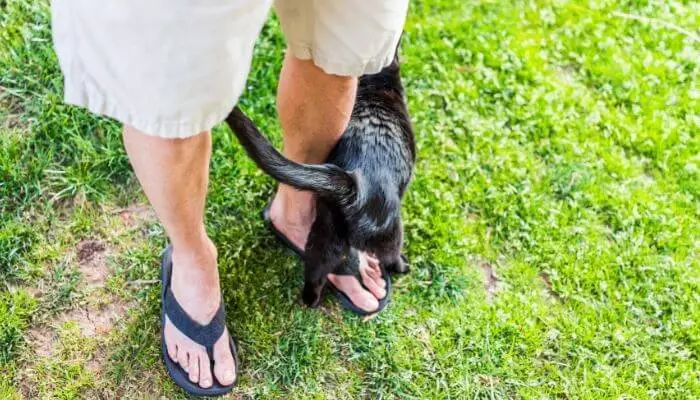
Otherwise, their human friends might lose their specific smell.
Cats release a number of scents from their anal sacs as they are petted on their backs, but it’s mostly due to the so-called ‘elevator butt’ action.
This is also the reason why some cats begin to hate being touched at the base of their tails after going through trauma or having that body region affected in some way – by skin allergies, impacted anal sacs, or lesions caused by other cats.
3. They Feel Safe With You
Have you ever seen a confrontation between two cats before?
If you have, you probably know that the one that gives up the fight will lay on their back and present their belly to the dominant cat so as to tell them that even the most vulnerable part of her body is now owned by the winner of the fight.
While cats that have their backs scratched or petted by their owners don’t feel threatened, they certainly feel safe.
If they were to feel anxious, scared, or reluctant about their living space or the people around them, they would certainly not put up with you touching their backs, never mind raising it due to the pleasure they might feel.
So when you see that your feline friend raises his or her back as you pet them, you can rest assured that nothing is distracting your cat’s attention and that he or she feels safe and well cared for by you.
4. They Could Be Ready To Mate
Intact females have a much higher likelihood of exhibiting this behaviour compared to spayed females or intact or neutered males.

By raising their backs even when you pet them, if they are in heat and they are ready to mate, they’re effectively signalling that it’s time and that they could be fertile.
In intact cats, this is called lordosis, but the position of the tail when they raise their backs is slightly different in that it will most likely be off to the side so as to make the mating easier.
Female cats that are in heat always tend to be more affectionate than the rest, so they might actively seek out back rubs and pets.
5. They Might Want To Be Cleaned There
A cat’s lower back is always a challenge when it comes to grooming, so your cat is definitely not going to have anything against you cleaning that area.
But the explanation for this behaviour, if it does happen, for this reason, is much more endearing.
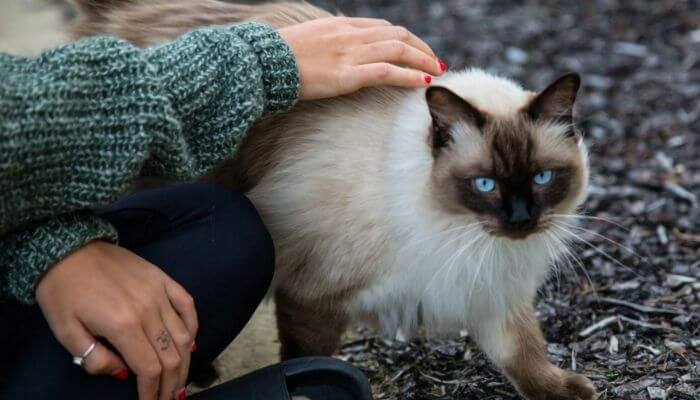
Kittens raise their backs when their mother grooms them so as to tell her that that’s the area they want to be cleaned and that they can’t reach properly.
But if you see that your cat’s starting to vigorously wag his or her tail and move away from you, it’s safe to say that you’ve petted your pet’s back enough and that you should now tend to other regions or engage in other activities such as play.
Do All Cats Like To Have Their Backs Petted?
No.
Not all cats like having their backs petted or touched, and some can be more sensitive than others, some cats can even have ticklish backs!
There is a lot of variety when it comes to what cats feel comfortable with you doing or not.
Some might like to be petted on their foreheads, while others might prefer to be petted on their cheeks or around their ears.
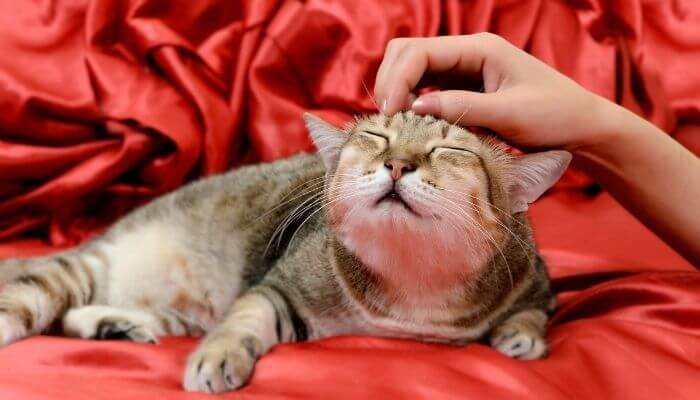
If your cat doesn’t like to be touched on his or her back, there might not necessarily be something wrong with your pet.
Granted, some cats that have urinary pathologies, especially kidney conditions, are going to want you to avoid their lower backs when grooming or petting them.
Another reason for this avoidance is hyperesthesia, which we are going to tackle in the section below.
Also Read: Why Do Cats Close Their Eyes When You Pet Them?
Hyperesthesia In Cats
Feline hyperesthesia syndrome is a condition where the cat shows an abnormal sensitivity to the skin.
The reason we are mentioning this syndrome here is that most cats exhibit this sensitivity on their backs.
Some cats can be very sensitive when being touched down the back, along the spine, or even at the base of the tail.
Others might show twitching in only one of these areas.
If your cat has this condition, she will show the following symptoms:
- Muscle spasms
- Skin rippling on the back
- Tail twitching (although it can be a sign of appreciation, too)
- Behavioural changes when being touched in the sensitive area (aggression, vocalisation, tail biting, or running)
While the vast majority of cats that have hyperesthesia are only going to show local sensitivity, in some cases, the issue might be so severe that it could lead to self-mutilation.
If this happens, the animal will pluck the hair in that area or lick or bite it excessively until it effectively causes dermatitis or other skin complications.
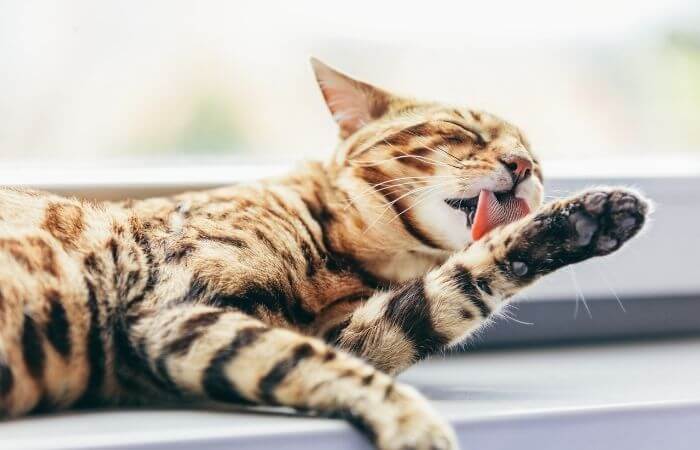
Feline hyperesthesia can be caused by stressful events such as:
- Moving homes
- Remodellings
- Significant changes in the cat’s schedule (such as you being away from home daily for 10-12 hours after working from home for years)
- Competitions among two cats that live in the same household
In many cases, solving these problems leads to the disappearance of the hyperesthesia symptoms altogether, so sooner or later, your cat is going to allow you to touch his or her back again.
Some vets can prescribe anti-anxiety medications if they are truly necessary, but most hyperesthesia cases are resolved by eliminating the factor that’s causing the problem.
Make sure to interact with your cat for at least ten to fifteen minutes every morning and every evening and add plenty of opportunities for entertainment to his or her living space, such as window perches, hiding tents, or cat trees.
As an Amazon Associate I may earn a small fee from qualifying purchases at no extra cost to you. This helps us run the site, so thanks for your support!

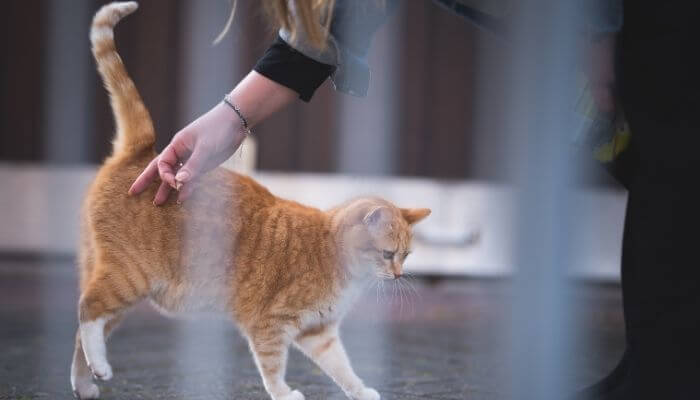

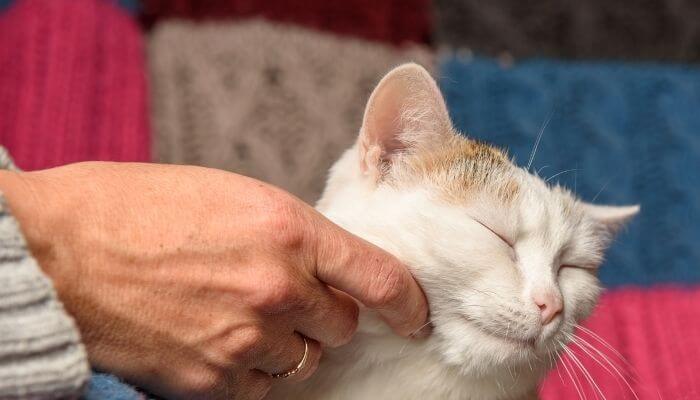
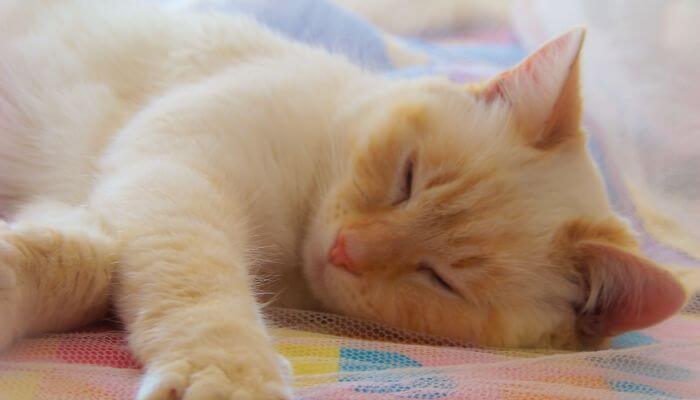

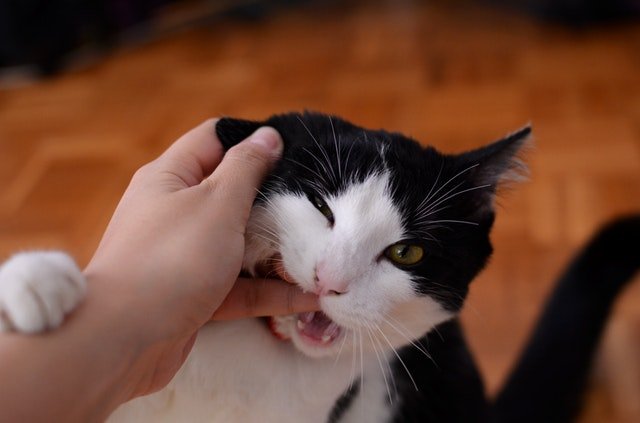

Leave a Comment